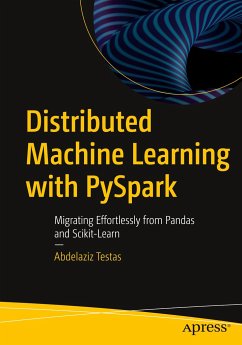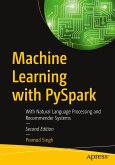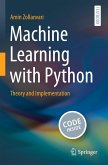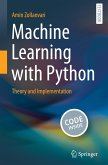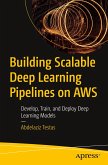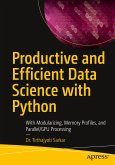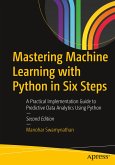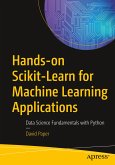Migrate from pandas and scikit-learn to PySpark to handle vast amounts of data and achieve faster data processing time. This book will show you how to make this transition by adapting your skills and leveraging the similarities in syntax, functionality, and interoperability between these tools.
Distributed Machine Learning with PySpark offers a roadmap to data scientists considering transitioning from small data libraries (pandas/scikit-learn) to big data processing and machine learning with PySpark. You will learn to translate Python code from pandas/scikit-learn to PySpark to preprocess large volumes of data and build, train, test, and evaluate popular machine learning algorithms such as linear and logistic regression, decision trees, random forests, support vector machines, Naïve Bayes, and neural networks.
After completing this book, you will understand the foundational concepts of data preparation and machine learning and will have the skills necessary toapply these methods using PySpark, the industry standard for building scalable ML data pipelines.
What You Will Learn
Master the fundamentals of supervised learning, unsupervised learning, NLP, and recommender systemsUnderstand the differences between PySpark, scikit-learn, and pandasPerform linear regression, logistic regression, and decision tree regression with pandas, scikit-learn, and PySparkDistinguish between the pipelines of PySpark and scikit-learn
Who This Book Is For
Data scientists, data engineers, and machine learning practitioners who have some familiarity with Python, but who are new to distributed machine learning and the PySpark framework.
Distributed Machine Learning with PySpark offers a roadmap to data scientists considering transitioning from small data libraries (pandas/scikit-learn) to big data processing and machine learning with PySpark. You will learn to translate Python code from pandas/scikit-learn to PySpark to preprocess large volumes of data and build, train, test, and evaluate popular machine learning algorithms such as linear and logistic regression, decision trees, random forests, support vector machines, Naïve Bayes, and neural networks.
After completing this book, you will understand the foundational concepts of data preparation and machine learning and will have the skills necessary toapply these methods using PySpark, the industry standard for building scalable ML data pipelines.
What You Will Learn
Master the fundamentals of supervised learning, unsupervised learning, NLP, and recommender systemsUnderstand the differences between PySpark, scikit-learn, and pandasPerform linear regression, logistic regression, and decision tree regression with pandas, scikit-learn, and PySparkDistinguish between the pipelines of PySpark and scikit-learn
Who This Book Is For
Data scientists, data engineers, and machine learning practitioners who have some familiarity with Python, but who are new to distributed machine learning and the PySpark framework.

